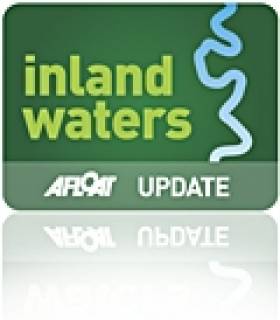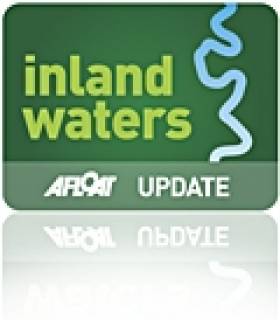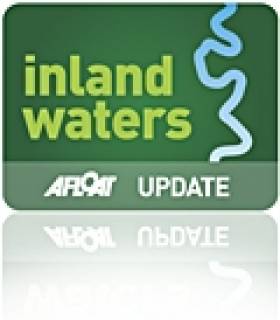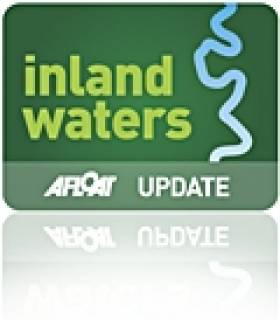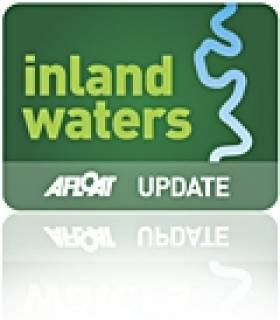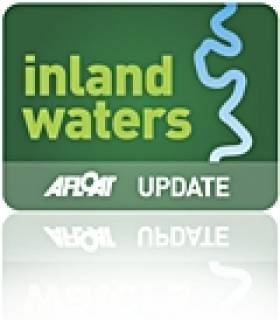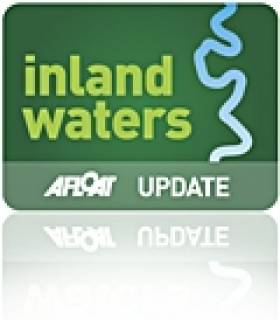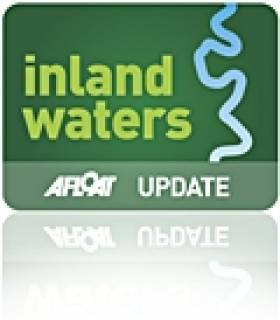Displaying items by tag: Canals
Inland Waterways Association Seek New Canal Bye-Laws
The Inland Waterways Association of Ireland (IWAI) has issued a public invitation to all candidates in the upcoming election to pledge their support for an IWAI call for provision to be made for new canal bye-laws via a dedicated Canal Bill during the next Dáil.
Support for this on- line pledge will help ensure that adequate byelaws are legislated for that will encourage the use and growth of the canals and be centred on the communities, users and tourism.
The pledge:
"IWAI request election candidates to pledge their support for an IWAI call for provision to be made for new canal bye-laws via a dedicated Canal Bill during the next Dáil when possible rather than including any future legislation in a joint Bill such as the Heritage bill 2016.
Furthermore in developing The Canal (Amendment) Bill 2017 that recognition be given to the canal users, canal communities and Local Authorities adjoining the canals by way of pre-legislative consultation and scrutiny. This approach would be in line with Government reform and best practice."
Candidates pledges of support will be registered opposite their names on the IWAI Website.
With no advance notice or consultation with the inland waterways stakeholders & canal communities the Heritage Bill 2016 was published on 4 January 2016.
IWAI advised that while it would welcome and support proper regulations the proposed Bill did not put user requirements, local communities or tourism at the centre of the regulations. Rather the now lapsed bill is a heavy handed approach that will result in lower boat traffic on the canals.
Prior to the 2016 Bill, in January 2014 Waterways Ireland brought forward proposals for amendments to the Canal Byelaws 1988 under the Canals Act 1986 & Maritime Safety Act 2005.
IWAI campaigned vigorously during the minimal consultation period of 21 days. Public discussion in 2014 on the matter included - the Canals and Barrow as a tourism resource; queries raised in the Seanad and the Dail; County Councils input; public meetings; national and local press articles; television and radio interviews; community websites; blogs and facebook pages. These all reflected the reservations of users, communities and public representatives as to the significant impact of the draconian suggestions in the proposed bye-laws.
The IWAI campaign resulted in an invite to appear before the Oireachtas Joint Committee on Environment, Culture and the Gaeltacht.
'Ongoing Liaison' Over Canal Bye-Law Proposals
#InlandWaters - Discussions between the Department of Heritage and Waterways Ireland over new draft bye-laws for Ireland's canals are "ongoing", according to Minister Heather Humphreys.
The minister was responding to a Dáil question on Thursday (30 April) from Kildare North TD Bernard Durkin on what moves have been made on the controversial bye-law changes suggested in last summer's report by Waterways Ireland.
"I am aware that concerns have been raised regarding certain aspects of the proposed bye-laws," she wrote, while reiterating her previous statement of 10 February last that the main stakeholders, as well as current permit holders on the three waterways – the Royal and Grand Canals and the Barrow Navigation – were invited to submit their views.
Though the minister did not address specific concerns such as those raised by the Inland Waterways Association of Ireland (IWAI) – which produced a long list of criticisms – she repeated the position that there is "ongoing liaison" between Waterways Ireland and her department, and that any final draft of bye-laws would be referred to her to decide upon.
She added that it is her "intention to afford interested deputies and senators an opportunity to discuss the proposals" before such a decision is made.
Wetsuits Make Canal Diving A Dream For Dublin Kids
#SillySeason - If you've been around either of Dublin's canals in the past couple of weeks, you may have seen some excited groups of young people gathered around the locks clad in wetsuits and launching themselves into the water.
The Irish Times has a video report on this latest trend that some city kids are making into a summertime sport - made possible thanks to the ready availability of inexpensive wetsuits from the likes of Aldi and Lidl.
As that paper's Ronan McGreevy writes: "They serve a dual purpose: keeping out the cold of the icy canals and helping to protect against the bugs that inevitably arise in an urban waterway."
Meanwhile, across the border some bathers have been taking things to the other extreme - as the Irish Mirror reports on two men arrested for skinny dipping in Belfast Lough.
The daring duo were reported by officers from Holywood PSNI for indecent exposure and, according to the Belfast Telegraph, they could even face inclusion on the sex offenders' register for their antics.
#InlandWaters - Waterways Ireland's recent report on consultation responses to the proposed changed to canal bye-laws is "an incomplete document" according to the Inland Waterways Association of Ireland (IWAI).
In a statement, the IWAI listed its criticisms of the report, namely that:
- There is no mention of the meeting with the Oireachtas Joint Committee on Environment, Culture and the Gaeltacht;
- There is no commentary on requests to change the future consultation period from 21 days to three months so that it is compatible with the Corporate Plan Consultation period and more customer friendly;
- There is no commentary on winter mooring provision on the Royal and Grand Canals and River Barrow as is provided on the Shannon navigation;
- Service level agreements and a customer services charter are not included;
- There is no mention of houseboats, despite this being a major issue;
- It fails to note that only one user group is still being subjected to charges;
- There is no mention of the €250 deposit on the extended mooring permit;
- There is no mention of the Barrow open boat fishing licence;
- There is no mention of requests to have a multi-agency approach to planning;
- There is no mention of daily mooring charges in Grand Canal Docks;
- There are no details provided on any impact assessment reports conducted by Waterways Ireland on proposals;
- The Dutch Barge Association submission is not noted or copy posted with all other submissions on the website; and
- The report includes what IWAI considers to be a wholly inaccurate statement on negative effect on tourism.
The association also claims that the report is "contradictory in itself", noting that "the section dealing with Waterways Ireland responses to the various submissions indicates that prior to addressing all concerns in relation to the bye-laws, there is significant work to be done by Waterways Ireland on a number of issues.
"Yet the section on the consultation process states that they have completed a final report with changes arising from consideration of the consultation process, and once viewed by senior counsel it will be forwarded to the Minister for Arts, Heritage and the Gaeltacht for his consideration and final decision."
The IWAI reiterated its position that the proposed Waterway Ireland canal bye-laws "do not put user requirements, tourism development and local communities at the centre of the regulations."
Offaly Council Says No To Proposed Canal Bye-Laws
#InlandWaters - The Inland Waterways Association of Ireland (IWAI) said this week it welcomed Offaly County Council’s rejection of the propsed canal bye-law amendments.
IWAI president Carmel Meegan said the decision was further proof that “the proposed bye-laws do not put user requirements, tourism development and local communities at the centre of the regulations.”
The motion was moved by Cllr Liam Quinn and seconded by Cllr Tommy McKeigue. It was passed unanimously by the council on Monday 28 April last.
Cross-party contributions highlighted areas of concerns with the draft amendments to the canal bye-laws, including the potential for the new rules as proposed by Waterways Ireland to damage canal-based tourism and related businesses in the Tullamore and Edenderry areas.
Also noted was the potential impact of the "prohibitive" enforement of a five-day rule for mooring.
Offaly County Council's position comes after the IWAI decried what it sees as an "information vacuum" over feedback to the proposed changes to the bye-lawa governing Ireland's canals, more than four weeks after the Joint Oireachtas Committee on Environment, Culture and the Gaeltact met to discuss submissions on the controversial proposals.
British Rivers And Canals Now On Google Street View
#InlandWaterways - Some of Britain's most famous inland waterways can now be followed on Google Street View thanks to the internet company's latest bit of kit.
The Canal & River Trust reports that it was the first organisation in the UK to take loan of Google's Trekker, a backpack device with a camera that captures images in all directions every 2.5 seconds wherever the wearer walks.
The Trekker allows Google's mapping team to reach areas that the Street View car and tricycle often cannot access, such as canal towpaths.
Now the fruits of labour by some 20 staff and volunteers of the Canal & River Trust can be seen online - such as Bingley's five locks on the Leeds & Liverpool Canal, Little Venice in London and the Pontcysyllte Aqueduct in North Wales.
Hopefully Ireland's own inland waterways won't be too far behind!
'Hundreds' To Be Affected By Proposed Canal Houseboat Charges
#Canals - 'Hundreds' of houseboat owners on Ireland's canals will be affected by a new charging regime in proposals to revamp bye-laws on the waterways, if projections based on last year's figures prove accurate.
In a written response to Dáil questions on Waterways Ireland's controversial plans, which have raised the ire of canal users throughout the country, Heritage Minister Jimmy Deenihan cited figures from the inland waterways body that put the number of combined mooring and passage permits issued in 2013 for boats on the Grand and Royal Canals at 276.
On top of that, 151 extended mooring permits were issued to boat owners intending to berth at fixed spots on the canals.
Regarding the growing unrest among canal boat dwellers raised by Kildare North TD Bernard Durkan - through whose constituency both the Grand and Royal Canals run - the minister made no response other than to confirm that any necessary discussions with Waterways Ireland would not take place until after the consultation process.
Giving an overview of Waterways Ireland's intentions to revamp the canal bye-laws to "best meet the needs of all waterway users", the minister added that concerned waterways users have the opportunity to express their views via the public consultation, which closes this coming Monday 3 February.
The Dáil questions and minister's answer can be found on KildareStreet.com HERE.
Just Days Left In Canal Bye-Laws Consultation
#Canals - Just a few days remain in the consultation period on proposed new bye-laws for the Grand and Royal Canals and the Barrow Navigation.
And the Inland Waterways Association of Ireland (IWAI) is urging its members and the public alike to get their submissions of concern in via the association before the deadline on Monday 3 February.
The latest statement from the IWAI refers to a number of meetings and protests throughout the country in response to the proposed introduction of new bye-laws that include charges for waterways usage and mooring, and fines for breaking the new regulations.
A meeting in Tullamore on 16 January was attended by many concerned groups and politicians to discuss the implications for rural counties.
More recently, Kildare IWAI's public meeting on Monday 27 January had a large attendance of waterways enthusiasts and public representatives.
And on the River Barrow groups and communities are affected and concerned by the new charge on their waterway of €50 per open fishing boat.
"The current bye-laws date from 1988, but have never been properly enforced," says the IWAI. "Instead of changing these properly for the better, to encourage navigation users, tourism and social development in and along the canals, Waterways Ireland instead in many cases suggest a draconian structure for boat use of navigations.
"This will deprive locations along waterways of all the social and economic advantages of boat tourism, from both the domestic and international markets."
Already the various proposed charges have caused consternation among waterways users, particularly those mooring houseboats who face fees of up to €3,500 each year.
"The boating community is not averse to appropriate management, facility provision, and access to waterways," says the IWAI.
"But boats are key attractions, as the lifeblood of the navigations, and need to be welcomed."
Ireland's Canal Users Mobilise Against New Bye-Laws, Charges
#Canals - Mooring permits costing up to €3,500 are among "a raft of charges and tolls" on the way for users of Ireland's inland waterways, according to the Irish Independent.
Last week the Inland Waterway's Association of Ireland lambasted new bye-law proposals that it fears will kill off "200 years of activity" on this country's canals.
And now the Irish Independent's John Drennan outlines some of these new charges, which include fees for boats "not constantly cruising or navigating" that start at €160 and rise to some €3,500 a year for large houseboat mooring permits.
Other fees include a €25 toll for passage through a series of locks in the capital, and a 'five-day rule' that will fine canal users €150 for keeping their vessels in one location for more than that time.
And the plans - currently open for consultation which ends next Monday 3 February - are prompting protest among waterways enthusiasts, with meetings planned next week in Sallins and Dublin amid fears that the canals will be abandoned by waterways users.
The Irish Independent has more on the story HERE.
IWAI Fears New Bye-Laws Will 'Kill Off' Boating On Canals
#Canals - The Inland Waterways Association of Ireland (IWAI) has lambasted what it sees as an attempt to kill off "200 years of activity" on Ireland's canals via proposed new bye-laws.
Last week Afloat.ie reported on the launch of the public consultation on changes to the Draft Canals Act 1986 (Amended) Bye-Laws that cover the Grand Canal, Royal Canal and Barrow Navigation, which closes in less than a fortnight on 3 February.
At a recent meeting of the association to discuss the proposed regulation changes, IWAI president Carmel Meegan spoke out against the imposition of "high charges" to boat traffic that would drive waterway users away.
"The proposed bye-laws do not put user requirements, tourism development and local communities at the centre of the regulations," she said at the meeting in Naas last Saturday 18 January.
In a statement, the IWAI emphasised that the proposed new boat-hostile bye-laws "are a major threat to the community economic gain of boat travel" in the canals, and pointed out that access to the 'Green & Silver" tourism route on the Grand and Royal Canal, the Shannon and Dublin waterways "is also in jeopardy".
It added: "The boating community is not averse to appropriate management, facility provision and access to waterways. But boats are key attractions, as the lifeblood of the navigators, and need to be welcomed."
In addition, the IWAI bemoaned the short consultation period of just 21 working days for the bye-law proposals, compared to the longer consolation for the Waterways Ireland draft Corporate Plan 2014-2016 that runs till 31 March.
The association urges its members to get involved in the consultation before the closing date on 3 February.



























